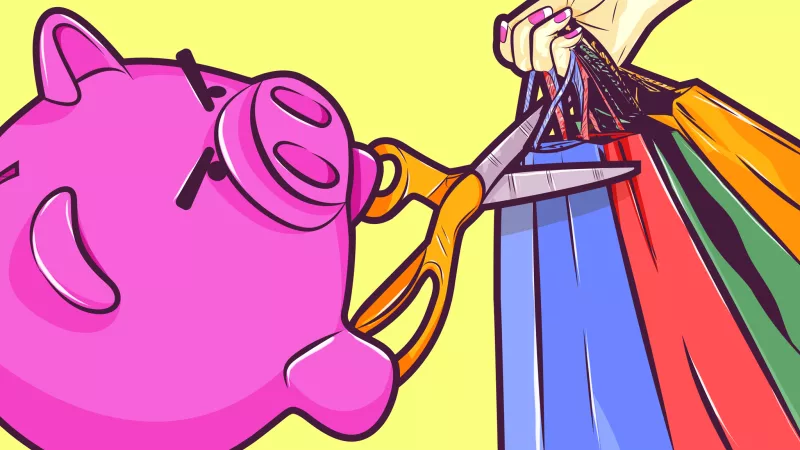If you ever see someone at IKEA with just one item at the check-out line, shake their hand. Or if you happen to be that someone, pat yourself on the back.
You see, IKEA is a place where you can say “I just came for a lamp”, but then end up leaving with a bath mat, bedspreads, books and to top it all off, some Swedish meatballs.
But don’t feel guilty if this has happened to you.
You’re human and being human means that you’ll be a sucker at times for certain psychological tricks which motivate you to shop impulsively. There are quite a few of these brain-hacks out there, but the one we want to discuss today is the “Gruen Transfer”.
More importantly, we want to talk about how you can override this sneaky little trick to save more, spend less and safeguard your credit score.
Victor Gruen & the Gruen Effect
The Gruen Effect is the moment when shoppers enter a mall or store with an intentionally confusing layout, forget their original purchase intentions, and become more prone to making impulse buys.
It’s like walking into a room and forgetting what you went for, only to find yourself doing something completely irrelevant. Of course, in a shopping mall, this is more than just kicking yourself for being forgetful because there’s money being wasted.
How Ikea Gets You To Impulsively Buy More
The term was named after Victor Gruen, an Austrian-born architect who pioneered and designed what would become the first shopping mall in the U.S.
He intended shopping malls to offer much more than stores and storefronts. He wanted them to evolve into mixed-used spaces that had apartments, medical centres, libraries and even bomb shelters (during the 50s when nuclear scares ran high).
Unfortunately, his vision never fully panned out (which frustrated him to the bone), and the concept of store layouts triggering people to buy what they don’t need was named after him. Poor guy.

Victor Gruen
Psychologists now refer to this Gruen Effect (a.k.a Gruen Transfer) as the reason why people will make an impulse buy (or two).
Now walking out with a bag of Doritos or a Starbucks Latte from time to time isn’t an issue, but frequent impulse buys can affect your finances and credit.
It typically happens slowly over time, but of course, bigger ticket impulse buys will put you in a deeper pit of debt, faster.
Impulse Shopping By the Numbers
The numbers on impulse shopping are in – and they’re shocking, but not too surprising. If it seems that more and more people are falling into a debt, you’re not just making an assumption – you’re dead right. In fact, there are numbers to show the impact that impulse buys have on the U.S. population.
Driven By Impulse
$5,400 – The average amount of money shoppers spend on impulse purchases per year – an average of $450/month.
$6,375 – The average total balance Americans carry on three credit cards (a 3% increase from 2017). Impulse buys often factor into these high balances.
$1,000,000,000,000 (Trillion) – The total amount of household credit card debt reached by Americans, according to data from the Federal Reserve.
The top five impulse buys include food/groceries, clothing, household, takeout and shoes. The percentage breakdown is as follows:
- 71% – Food/Groceries
- 53% – Clothing
- 33% – Household products
- 29% – Takeout
- 28% – Shoes

Ikea is frequently sighted for its confusing layout and tempting product displays – a classic example of the Gruen Effect at work.
Impulse Buying’s Effect On Credit Score
Now the repercussions of impulse buying on credit are indirect. After all, your credit score isn’t going to drop just because you bought a fidget spinner. With that said, habitual impulse buying can affect your finances in ways that can have a ripple effect on your credit score.
How Impulse Buys Indirectly Kill Good Credit Scores
- Racking up high balances and debt – Spending $3 at the nearest 7-Elevens doesn’t seem like much, neither does buying a $20 “treat” off of Amazon. And that’s the problem. For many people, these impulse buys occur weekly (sometimes daily), and the transactions fees slapped on top these purchases add up. Before you know it, you might wonder where your money went and face a higher balance on your credit card. Of course, a high balance on your card can negatively affect your credit score.
- Draining your accounts/funds – Your chequing account might seem like an unending well of funds until you’re nearing insufficient funds. The problem here is that when the money gets low, you might have to dip into your savings account, a line of credit, and other accounts that should be left untouched. Of course, a higher balance on things such as lines of credit can impact your score, but having to pull money from other accounts can put you in really sticky situations. For example, if you have to use emergency funds before an emergency happens (because of splurging) when an emergency actually happens, you might now be forced to rely on credit in financially unhealthy ways.
- Ignoring your statements – This point ties into the two mentioned above. Typically, when buying something on the fly, that last thing you’ll think about is your account balance at that moment. Looking at your account to see your available funds is a form of rational thinking. Buying an item on a whim is a form of emotional thinking. The two almost never mix. With that said, not checking your account balances is a quick way to drain your funds, which can mean borrowing more money than you really should for more important purposes.
Gruen-Free: How To Stop Spending Money Impulsively

The key to conquering your impulses and the Gruen transfer is to turn off the triggers of an impulse buy in the first place. There are hundreds of these triggers and you’ll really have to understand yourself to identify them. With that said, there are five areas that should cover your bases.
1. Break Down Costs For a Better Perspective
We often forget to look at the real cost of the items we buy, but doing so might help you think twice about tapping your visa. There are a few ways to put costs into perspective.
For example, you can look at the cost of an item, and then consider how long it took you to earn that amount. So if something costs $200 and you earn $20/hour, it will take you 10 hours to pay that item off.
Also look at the illusory aspects of a “bargain” price. Maybe you didn’t want to spend $25 on plain T-s. But at $5 a pop, who wouldn’t take a few? Blindsided by the supposed deal, you might add five of them to your cart – a classic way in which we overspend.
So next time you see something that’s really cheap, consider how much it would cost if you bought multiples of that item. This line of thinking can save you tons of cash, whether you’re shopping at Walmart, Amazon or any retail store for that matter.
2. Don’t Shop When Your Brain Is Busy
Your brain is an organ of paradoxes. It can process an almost infinite number of “data bits”, but if you consciously give it too much to think about, your decision-making will suffer. One study had its participants try to remember a seven-digit number while shopping. What were the findings?
The shoppers made more impulsive buys than those who didn’t have to remember those seven digits. The lesson here is to avoid making purchases if you’re juggling many priorities, are in a rush, or stressed out.
Your working memory, although amazing in its capacity, has limits and you’re less likely to think things through when it gets strained. So make sure to do your shopping when your mind is clear.
3. Eat Before You Swipe
The idea of eating before shopping might seem strange, but there’s a science to this. Your brain needs glucose, which is then broken down to make a molecule called ATP (Adenosine Triphosphate) to fuel many cognitive processes including decision-making. Take a page from those Snickers commercials – you’re not yourself when you’re hungry.
If your brain is deprived of glucose, you might not have the fuel to make clear decisions. With a foggy brain, you’re more likely to make an impulse buy. So, for the record, if you’re going to spend a little extra at IKEA, you might want to fill up on those meatballs before looking at the furniture.
4. Sleep On It
You’ve no doubt heard the advice to “sleep on it” when facing a major decision. An impulse buy such as a case of Ferrero Rocher chocolate doesn’t need deep contemplation, but something like an Apple Watch or some other fitness tracker could use some extra thought.
Sure, these devices are cool and helpful for the biggest fitness buffs among us, but is your current routine suffering because you don’t have a fancy wristwatch?
Simply taking a few days to think about it (and of course, your account balances) may naturally distract you from that purchase and forget about it altogether. And if that happens, it’s safe to say that you probably didn’t need it to begin with.
5. Psycho-Analyze Yourself
Our last piece of advice involves you playing the role of a psychologist. You’ll be assessing yourself of course, and in typical psychology fashion, you’ll have to ask yourself some probing questions.
Before adding an item to your cart, ask yourself:
- “What if I wait?” – So-called “limited-time-offers” are rarely as limited as they may seem, and so-called “sales” can be deceptive.
- “How will I pay for it” – If the first answer is from your savings account, credit card or line of credit instead of funds allocated to buy that item, then put it back.
- “How do I feel?” – This question relates to our earlier piece of advice which is to avoid making purchase decisions when you’re not in the right frame of mind. So if you realize that you’re frustrated, feeling blue or anxious for whatever reason, accept that you might only want an item to soothe a negative emotion.
Resisting Impulse Buys Is a Brain Game
Remember this: Impulses don’t make people broke, acting on them does.
Shopping malls and their various departments and layouts are fighting against your self-discipline to some extent.
Recognizing these external stimuli and silencing your internal triggers is the key to avoiding impulse buys, and the possible repercussion of poor credit.
So next time you step into an IKEA (or any other store for that matter), rest assured that you can win the battle against temptation.

